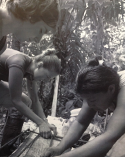 Education: B.S. in Environmental Engineering from the University of Florida
Education: B.S. in Environmental Engineering from the University of Florida
Job Overview: Professional Environmental/Civil Engineer focused on water/wastewater/reuse process design, hydraulics, hydraulic modeling, facilities planning, and program management.
How I ended up at MWH: My first introduction to MWH was meeting a former MWH employee at a WEFTEC conference while attending as a student. His passion for his work and the company is what inspired my interested in MWH. I later started as an intern in the Fort Lauderdale office and began full time just after graduation. I have now been with Fort Lauderdale just over 6 years.
What is on my desk right now: Work plans for various cities in Florida.
Free time activities: Engineers Without Borders (EWB) - mentoring FIU student chapter on a water supply project in Costa Rica, serving on the EWB-USA mentoring committee, and MWH’s EWB Steering Committee, YPG (MWH Young Professional’s Group) - currently the G&I Community Outreach Co-Char, yoga and outdoor adventures.
Best career advice I’ve ever received: Follow your passion
Experiences at MWH: MWH has an integrated global workforce along with its recent partnership with EWB-USA presents a great opportunity for global collaboration on Engineers Without Borders projects. Having a diverse group of employees from various locations across the globe working together on projects along with students and community partners provides incredible hands-on learning and development opportunity for employees while furthering both MWH and EWB’s shared vision of Building a Better World.
Story to tell: I have been volunteering as a mentor to the Florida international University student chapter of Engineers Without Borders for the past 5 years on a water supply project in a small rural town called Tonjibe in Costa Rica. On our last Implementation trip (August, 2010) I accompanied a group of students to construct several spring boxes for source water collection of natural springs that exist on a neighboring mountain. The construction was incredibly arduous as our methods for construction were completely manual and required hauling of materials 1 mile uphill through the jungle. We employed the aid of a few donkeys and horses but there was still a need for individuals to carry whatever they could to expedite the effort. While there were many strong men on our team and in the community, there were also several strong women on our team that assisted in not only the hauling of materials but also hands-on in construction. Initially the women of the community offered help in supporting roles such as cooking meals and serving coffee and tea during construction, however, after only a few days of witnessing the hard manual labor of the women on our team, the women of the community also decided they too would roll up their sleeves and join in the construction efforts, which was a major paradigm shift for the role of women in this community. Each day as the work bus came by to pick up the construction crew, more and more women (mothers, sisters, and cousins) from the community put on their boots and joined the team. I share this story to demonstrate that the power of ‘leading by example’ should not be underestimated in creating social change and we all have a role to play.
